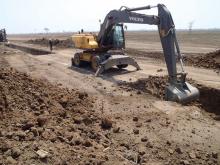Land Library
Bienvenue dans la bibliothèque du Land Portal. Explorez notre vaste collection de ressources en libre accès (plus de 74 000), comprenant des rapports, des articles scientifiques, des articles de recherche, des publications évaluées par des pairs, des documents juridiques, des vidéos et bien plus encore.
/ library resources
Showing items 1 through 9 of 27.This paper explores the impact of large-scale agricultural investment on household livelihood outcomes among smallholder farmers in Kilombero Valley, Tanzania. The study used qualitative and quantitative data from a sample of 376 households.
The study reviews the land policy in Zimbabwe and investigates the extent to which the policy provides incentives for investment and technology adoption to increase labour productivity in the agricultural sector.
ABSTARCTA common limiting factor to the development of agriculture on the continent is the amorphous land administration laws and practices which in certain locations, is dominated by traditional administration and inheritance among an ever-increasing population, leading to fragmentation of
This paper aims to explore implications of large-scale land investment for local citizenship, with a particular focus on customs and mobility. The concept of local citizenship is a neglected aspect of land investment debates.
To address food insecurity, the Government of Ethiopia embarked on a rapid transformation in the agriculture sector to increase production, productivity, market access and create employment opportunities by promoting large scale agricultural investment projects.
Sierra Leone is one of the least developed countries in the world and is still recovering from a civil war that ended in 2002.
The buying up of farmland by international investors is viewed highly critically. However, sweeping judgements could be inappropriate, as our author demonstrates with survey results from Ethiopia and Uganda.
During the last few years, the donor community has increased its efforts to reduce the large amounts of fish lost in the distribution chain in artisanal fishery, an endeavour that ought to be welcomed in principle.
Providing extension and advisory services is expensive. There are salaries to be paid, transportation and operational funds to be provided, buildings to be rented or built, demonstration plots to maintain, and continued education to be offered to the extension staff.





